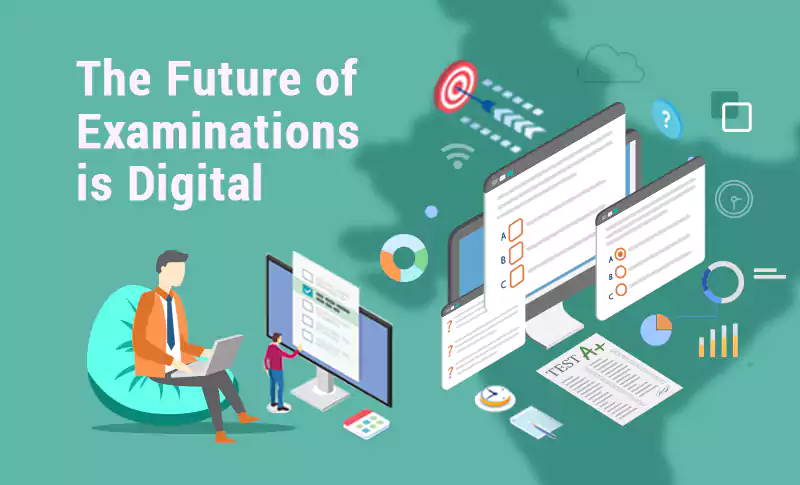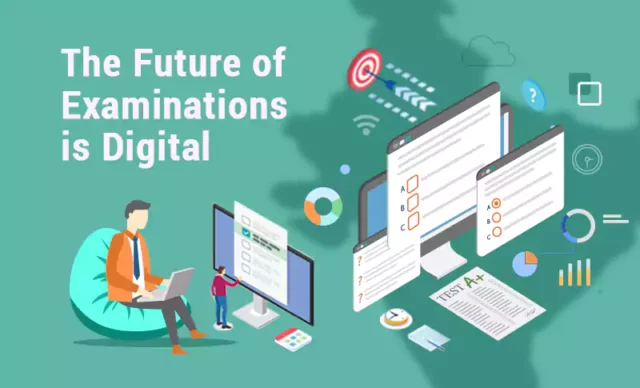In a world increasingly shaped by technology, the future of exams is stirring intense debate. As Nigeria and many nations accelerate digital transformation, one central question rings loud: will traditional pen-and-paper testing withstand the wave of digital disruption?
Table of Contents

From Industrial-Era Exams to AI-Empowered Assessments
Traditional examinations—the century‑old, factory‑model, memory-based assessments—were originally designed to sort candidates through speed and recall. But the modern world demands much more: creativity, collaboration, critical thinking, and ethical reflection. Today’s artificial intelligence tools like GPT‑4 now outperform many humans on bar and medical exams, challenging the relevance of memory‑heavy testing.
As knowledge becomes ubiquitous and AI handles routine recall, conventional exams risk becoming relics of the past.
Digital Exams: Convenience, Adaptivity, and New Metrics
Digital platforms are transforming assessment in three powerful ways:
- Adaptive testing: exams that adjust in real‑time to a candidate’s ability, offering more accurate scoring.
- Enhanced security tools: AI-based proctoring, biometric checks, and screen‑sharing systems that guard against cheating.
- Engaging formats: interactive simulations and open‑book designs that assess problem-solving and deeper understanding .
Such innovations make assessments more inclusive, flexible, and aligned with real-world skills—clear advantages over conventional formats.
Challenges: Integrity, Equity, and Privacy
Despite their promise, digital exams are not without contention:
- Academic integrity risks: Proctoring tools have been shown to flag innocent behaviours or be bypassed entirely, undermining trust.
- Technical issues and equity gaps: Students may experience connectivity failures, device access problems, or browser crashes during critical exams. Many learners across Nigeria still lack stable internet or reliable devices—a digital divide that risks marginalising rural and underserved communities.
- Privacy and ethical concerns: AI proctoring can feel intrusive—monitoring eye‑movement and behaviour—and may affect student mental health and autonomy.

The Rise of AI-Assisted Learning and Resistance
Students are rapidly incorporating AI tools like ChatGPT into their studies—not necessarily to cheat, but as study aids. A UK student recently argued that AI helped structure essays and cope with the unstable assessments post‑pandemic. Yet critics fear such tools could erode academic integrity if formal assessments remain unchanged.
Meanwhile, educational boards like UK’s Ofqual warn against overreliance on AI-assisted coursework or online assessments due to malpractice and inequality risks, even while supporting innovation in testing methods.
Hybrid Assessment Designs: A Balanced Way Forward
The tension between old and new formats is pushing educators toward hybrid models. Institutions worldwide are exploring:
- Mixing in-person pen‑and‑paper exams with digital tasks. Some instructors, wary of AI cheating, are returning to handwritten tests while incorporating project-based digital components or open‑book research assignments.
- Redesigning assessments to emphasise oral exams, collaborative projects, reflections on AI usage, and scenario‑based tasks rather than recall tests.
Such blended systems promise to balance integrity, depth of learning, and real-world relevance.
Nigeria’s Education Landscape: EdTech Attempting Transformation
In Nigeria, digital disruption in education is already underway. Platforms like Pass.ng, launched in 2012, and Afrilearn, established in 2019, are redefining how students prepare for national exams such as JAMB, WAEC, NECO and BECE. These apps offer practice questions, interactive lessons, and results analytics—bringing digital practice to the finger‑tips of many learners.
Yet national exam bodies like WAEC still conduct pencil-and-paper exams, though digital graduation certificates are now emerging—a nod toward some digital integration.
Meanwhile, the government‑led 3 Million Technical Talent Programme (3MTT) aims to equip Nigerians with tech skills—including AI and cloud computing—toward 2027 goals. Though not directly tied to exams, it does illustrate the nation’s broader digital ambitions.
What Lies Ahead: Redesign or Resist?
Will traditional exams vanish? Not likely in the near term. But they will evolve:
- High‑stakes memorisation tests may give way to more authentic, adaptive and AI‑aware assessments.
- Security tech will grow more robust, though ethical guidelines and transparency must keep pace.
- Hybrid formats combining pen‑and‑paper with online, oral, project‑based and reflective components will likely become the norm.
In Nigeria, embracing this shift will require careful attention to infrastructure, teacher training, equity, and digital ethics.
Action Points for Nigerian Stakeholders
To navigate this changing landscape effectively:
- Strengthen digital infrastructure and access: Ensuring power supply, internet bandwidth, and affordable devices nationwide.
- Train educators in tech-driven assessment design: Guiding how to develop AI‑resistant or AI-embracing exam formats.
- Update policy and regulation: Bodies like JAMB, WAEC, NECO must overhaul exam rules, invigilation standards, and ethical frameworks to reflect digital realities.
- Pilot hybrid systems: combining simulations, open‑book tasks, oral interviews, and traditional exams to see what blends work best.
- Safeguard fairness: Monitor digital disparity, mental health, and student data privacy at every level.

Conclusion: Traditional Exams in a Digital Future
The future of exams is unmistakably digital—whether through blended formats, simulated assessments, or AI‑aware design. But traditional testing isn’t over yet. Rather, it’s at a crossroads. With thoughtful adaptation, the strengths of both digital innovation and human-centred assessment can be combined.
Nigeria has already witnessed EdTech-led transformation of exam preparation. The next frontier lies in integrating integrity, ethics, and equity into the formal exam system itself. As the educational ecosystem shifts, those who invest in inclusive, flexible, and future-ready assessments won’t just survive—they will lead.
Join Our Social Media Channels:
WhatsApp: NaijaEyes
Facebook: NaijaEyes
Twitter: NaijaEyes
Instagram: NaijaEyes
TikTok: NaijaEyes
READ THE LATEST EDUCATION NEWS








































